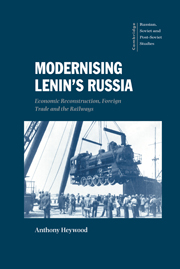Book contents
- Frontmatter
- Contents
- List of illustrations
- List of tables
- Acknowledgements
- Technical note
- List of abbreviations and acronyms
- Introduction
- PART I Towards economic reconstruction, 1917–1920 the birth of the railway imports policy
- PART II Trade and isolation, 1920–1921 implementing the railway imports policy
- 3 Krasin's first results
- 4 Approaches to Britain and Germany
- 5 Second thoughts
- PART III Retreat, 1921–1924
- Conclusion
- Notes
- Bibliography
- Index
- Cambridge Russian, Soviet and Post-Soviet Studies
- Plate Section
4 - Approaches to Britain and Germany
Published online by Cambridge University Press: 14 August 2009
- Frontmatter
- Contents
- List of illustrations
- List of tables
- Acknowledgements
- Technical note
- List of abbreviations and acronyms
- Introduction
- PART I Towards economic reconstruction, 1917–1920 the birth of the railway imports policy
- PART II Trade and isolation, 1920–1921 implementing the railway imports policy
- 3 Krasin's first results
- 4 Approaches to Britain and Germany
- 5 Second thoughts
- PART III Retreat, 1921–1924
- Conclusion
- Notes
- Bibliography
- Index
- Cambridge Russian, Soviet and Post-Soviet Studies
- Plate Section
Summary
If Krasin had a motto when he arrived in London in late May 1920, doubtless it was ‘Everything for the Trade Agreement!’ But though the Anglo-Soviet negotiations dominated his attention until an agreement was signed in March 1921, Soviet endeavours to agree commercial contracts did continue. Railway business took much of this effort, these ten months seeing not only Lomonosov's appointment, Solomon's Estonian contract and the commencement of work by Nohab, but also discussions with Austrian, Czech, Italian and other firms together with numerous fruitless meetings with trading companies about American decapods. The most important projects were negotiations with British and German engineering companies held by Krasin and Lomonosov respectively, plus the formation of a unique Soviet foreign trade organisation – the Russian Railway Mission Abroad – specifically for managing railway contracts. It is with Krasin's railway discussions in Britain and Lomonosov's first German negotiations that this chapter is concerned.
The British connection
Accounts of Krasin's negotiations with Lloyd George's government have tended to assume that the British were tempted into signing the Anglo-Soviet Trade Agreement by Krasin's promises of large expenditure. Was this really the case, and if so, how? Probably by far the largest prospective contract concerned railway locomotives, and its history casts new light on the origins of the trade agreement.
- Type
- Chapter
- Information
- Modernising Lenin's RussiaEconomic Reconstruction, Foreign Trade and the Railways, pp. 110 - 134Publisher: Cambridge University PressPrint publication year: 1999

